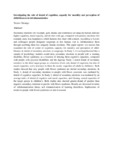Please use this identifier to cite or link to this item:
https://cris.library.msu.ac.zw//handle/11408/3583| Title: | Investigating the role of denial of cognition, capacity for morality and perception of child-likeness in infrahumanization | Authors: | Chisango, Tadios | Keywords: | Infrahumanization Down syndrome Morality |
Issue Date: | 2012 | Publisher: | Kamla-Raj Enterprises | Series/Report no.: | Journal of Social Sciences;Vol. 30; No. 1: p. 71-81 | Abstract: | Secondary emotions (for example, guilt, shame, and tenderness) are uniquely human, indicate higher cognition, moral capacity, and develop with age, compared with primary emotions (for example, pain, fear, happiness), which humans also share with animals. According to Leyers and colleagues people designate outgroups as less human, that is, infrahumanize them through ascribing them less uniquely human emotions. This paper reports two studies that examined the role of denial of cognition, capacity for morality and perception of child-likeness in denial of secondary emotions to outgroups. In Study 1, it was hypothesized that a sample of psychology students would deny secondary emotions to people with a learning disability, Down syndrome, as a function of denying them cognitive capacities, compared with people with physical disabilities and the ingroup. Study 2 tested denial of secondary emotions to the three target groups as a function of not only denial of cognition, but also of moral capacities, and a tendency to liken the mental capacities of adults to children’s. Both studies showed that only people with Down syndrome are denied secondary emotions. In Study 1, denial of secondary emotions to people with Down syndrome was mediated by denial of cognitive capacities. In Study 2, denial of secondary emotions was mediated by an average index of denial of cognitive and moral capacities, and likening mental capacities of the target groups to children’s. Both studies also showed greater denial of positive than negative secondary emotions to people with Down syndrome. Results are discussed in terms of infrahumanization theory and romanticization of learning disabilities. Implications of results to people with Down syndrome are also discussed. | URI: | https://www.tandfonline.com/doi/abs/10.1080/09718923.2012.11892984 http://hdl.handle.net/11408/3583 |
ISSN: | 0971-8923 |
| Appears in Collections: | Research Papers |
Files in This Item:
| File | Description | Size | Format | |
|---|---|---|---|---|
| Investigating the role of denial of cognition.pdf | Abstract | 100.99 kB | Adobe PDF |  View/Open |
Items in MSUIR are protected by copyright, with all rights reserved, unless otherwise indicated.



